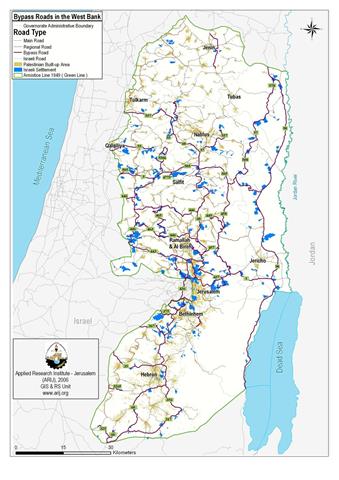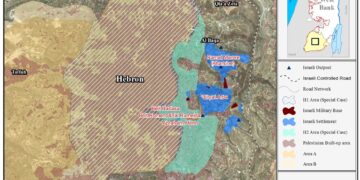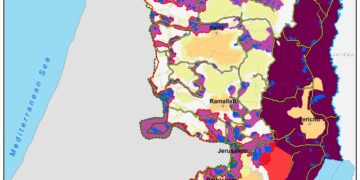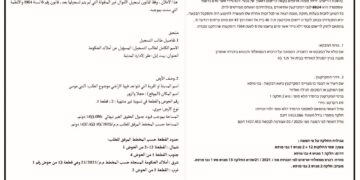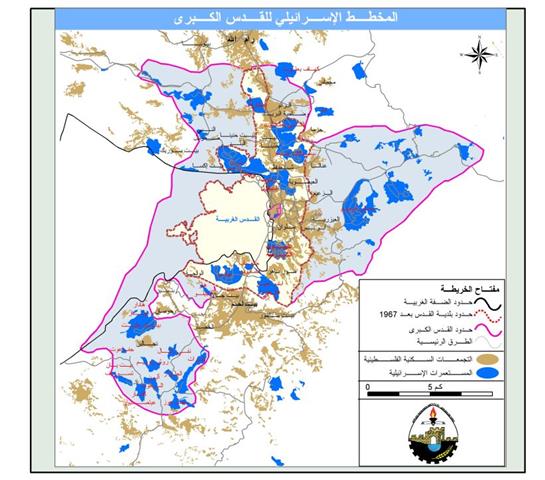A new Israeli scheme to further separate Israeli settlers and Palestinians in the West Bank has been rejected by the illegally present settlers of Efrata. The military proposal is to mark all settlers cars with stickers so that they can pass through military check points more easily and not have to wait with the Palestinian traffic. 'The aim of the sticker is to make it easier for residents to get through West Bank checkpoints.' [y-net]
For Palestinians this will mean a tightening of the segregation system in the West Bank. Since the illegal colonization of the West Bank began after its occupation by the Israeli Army in 1967, the Israeli state has constantly sought new ways of furthering the separation of native Palestinian and Israeli Settlers infrastructure. The official rationale for this policy is to protect the illegal settlers from Palestinian violence. In reality the division of infrastructure between Palestinian and Israeli areas is a means by which, the Israeli state can further control the Palestinian population of the West Bank.
In line with such logic practiced over the past four decades, the Israeli state had constructed a vast network of 'by-pass' roads to link all Israeli settlements in the West Bank. In total, some 795 km were constructed by 2005 (ARIJ). Given that these settlements are scattered across the territory, and coupled with the fact that Palestinians are forbidden to use the majority of this infrastructure, the reality on the ground is that this network has calved Palestinian territory into 64 disconnected 'Bantustans' of isolated land. This allows Israel to maintain full economic and military control of the West Bank. See Map 1
Clearly, this situation is economically and logistically intolerable as it is impossible for Palestinians to move from one town or village to another without passing through Israeli controlled territory or using their illegal road network. The only concession to territorial contiguity is that the state allows public taxis to travel on some settlers roads. This is still crippling for the economy as goods cannot move.
One side effect of allowing Palestinians limited use of the settlement roads is that the state feels obliged to place military check points along their routes. The official context for these check points is to provide 'security', but in reality their main purpose is to harass Palestinian road users. In the light of this, the reasoning behind the new 'sticker system' becomes clear. In spite of the fact that it is virtually impossible for a Palestinian to travel from one town/ village or city to the other without being stopped and waiting for prolonged periods of time at military check points, the settlers resent the traffic jams created by the waiting Palestinian cars. The military logic behind the sticker system is that settlers will be able to travel along the entire network of illegal settler roads without being stopped, whilst the Palestinians (the legal inhabitants and owners of the territory under international law) will be forced to wait at check points. This will further heighten the segregation of the two populations in the West Bank.
Interestingly, the settlers of Efrata colony have rejected the plan, '…technically, there won't be any easing of the bigger jams, in the bottleneck of the tunnels checkpoint, since the Arabs will of course fake the sticker and place it on their cars.' [Efrata settlers petition – cited in Y-net] In spite of this officially given reason, one must question the logic of why the settlers of Efrata are concerned about a system which is designed to easy their own movement between their illegal colonies.
For an answer to this question we can turn to the redeployment from the Gaza strip. During Israel's military strategic and economic withdrawal from the settlements within the strip, slightly over 8000 Illegal Israeli settlers had to be evacuated. In spite of the fact that they received gross amounts of compensation, which severely over-valued their illegal property, extremist settlers from other settlements created a campaign to make the withdrawal process difficult. In reality, these protests served the goals of the state perfectly as they allowed Israel to present itself as making a gallant step towards peace against the will of its people. In reality, only a small number of a few thousand Gaza settlers took part in the demonstrations. However, the majority of these protestors were from other settlements like Efrata in the West Bank.
On the ground however, these internal disputes between Israelis have little consequence for Palestinians. This dispute merely serves to highlight how far the system of segregation in the West Bank has gone. By proposing the plan, the military is declaring that they wish to spare the settlers the inconvenience of waiting at check points, or rather; they are refusing to allow the settlers to be treated like Palestinians. The fact that Palestinians are treated like this at all in their own territory by an occupying power is in gross contravention of international law which highlights the apartheid like nature of the regime.
Article 13 of the Universal Declaration of Human Rights and article 12 of the International Covenant on Civil and Political Rights entail the right to move freely from one place to another within the state.
Article 13:
-
Everyone has the right to freedom of movement and residence within the borders of each State.
-
Everyone has the right to leave any country, including his own, and to return to his country.
Article 12:
-
Everyone lawfully within the territory of a State shall, within that territory, have the right to liberty of movement and freedom to choose his residence.
-
Everyone shall be free to leave any country, including his own.
The above-mentioned rights shall not be subject to any restrictions except those which are provided by law, are necessary to protect national security, public order, public health or morals or the rights and freedoms of others, and are consistent with the other rights recognized in the present Covenant.
-
No one shall be arbitrarily deprived of the right to enter his own country.
The fact that a system is being proposed to allow 'certain' people to pass through these restrictions demonstrates how existentially racist the Israeli colonial regime in Palestine is.
References
'International Covenant on Economic, Social and Cultural Rights.' Office of the High Commissioner
for Human Rights. 3 January 1976 http://www.unhchr.ch/html/menu3/b/a_cescr.htm.
'International Covenant on Civil and Political Rights.' Office of the High Commissioner for
Human Rights. 23 March 1976 http://www.unhchr.ch/html/menu3/b/a_ccpr.htm.
'Universal Declaration of Human Rights.' The General Assembly of the United Nations.
Prepared by
The Applied Research Institute – Jerusalem
ARIJ


